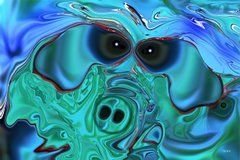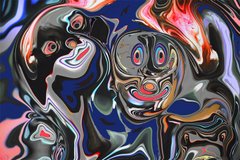new drug that will enhance his performance but that can not be detected by the labs and returns to the Tour de France 2009
Everybody knows he used drugs before to win his other tours, I wonder if the French Tour Organisation will let him start in 2009.
A very brief summary/overview of his drug use.
In 2004, sports reporters Pierre Ballester and David Walsh jointly published a book alleging Armstrong had used performance-enhancing drugs (L. A. Confidentiel - Les secrets de Lance Armstrong). It contains allegations by Armstrong's former masseuse Emma O'Reilly who claimed that Armstrong once asked her to dispose of used syringes and give him makeup to conceal needle marks on his arms.[19] Another key figure in the book, Steve Swart, claims that he and other riders, including Armstrong, began using drugs in 1995 while they were members of the Motorola team, a claim since denied by other team members.[20] Allegations in the book were reprinted in the UK newspaper The Sunday Times in a story by deputy sports editor Alan English in June 2004. Armstrong subsequently sued the newspaper for libel, which settled out of court after a High Court judge in a pretrial ruling stated that the article "meant accusation of guilt and not simply reasonable grounds to suspect."[21] The newspaper's lawyers issued the following statement: "The Sunday Times has confirmed to Mr Armstrong that it never intended to accuse him of being guilty of taking any performance-enhancing drugs and sincerely apologised for any such impression." (See also[22] in The Guardian). Armstrong later dropped similar lawsuits in France.[23]
On March 31, 2005, Mike Anderson filed a brief [24] in Travis County District Court in Texas, as part of a legal battle following his termination in November 2004 as an employee of Armstrong. Anderson worked for Armstrong for two years as a personal assistant. In the brief, Anderson claimed that he discovered a box of Androstenine while cleaning a bathroom in Armstrong's apartment in Girona, Spain.[25] While Androstenine is not on the list of banned drugs, the substances androstenedione and androstenediol are listed. However, Anderson stated in a subsequent deposition that he had no direct knowledge of Armstrong using a banned substance. Armstrong denied the claim and issued a counter-suit.[26] The two men reached an out-of-court settlement in November 2005, the terms of the agreement undisclosed.[27]
On August 23, 2005, L'Équipe, a major French daily sports newspaper, reported on its front page under the headline "le mensonge Armstrong" ("The Armstrong Lie") that 6 urine samples taken from the cyclist during the prologue and five stages of the 1999 Tour de France, frozen and stored since at "Laboratoire national de dépistage du dopage de Châtenay-Malabry" (LNDD), had tested positive for EPO in recent retesting conducted as part of a research project into EPO testing methods.[28][29] For years, it had been impossible to detect the drug, called erythropoietin, which builds endurance by boosting the production of oxygen carrying red blood cells. The world governing body of cycling, Union Cycliste Internationale (UCI), did not begin using a urine test for EPO until 2001, two years after the sample were taken. This claim was based on an investigation in which they claimed to be able to match samples from the 1999 Tour that were used to hone the EPO test to Armstrong.[30] To establish a link between Armstrong and the samples, the LNDD matched the tracking numbers on the samples with those on Armstrong's record with the UCI during the 1999 Tour. Armstrong immediately replied on his website, saying, "Unfortunately, the witch hunt continues and tomorrow’s article is nothing short of tabloid journalism. The paper even admits in its own article that the science in question here is faulty and that I have no way to defend myself. They state: 'There will therefore be no counter-exam nor regulatory prosecutions, in a strict sense, since defendant’s rights cannot be respected.' I will simply restate what I have said many times: I have never taken performance enhancing drugs."[31]
In June 2006, French newspaper Le Monde reported claims made by Betsy and Frankie Andreu during a deposition that Armstrong had admitted using performance-enhancing drugs to his physician just after brain surgery in 1996. The Andreus' testimony was related to litigation between Armstrong and SCA Promotions, a Texas-based company that was attempting to withhold a $5-million bonus; this was eventually settled out of court with SCA paying Armstrong and Tailwind Sports $7.5 million, to cover the $5-million bonus plus interest and lawyers' fees. Armstrong later issued a statement suggesting that Betsy Andreu may have been confused by possible mention of his post-operative treatment which included steroids and EPO that are routinely taken to counteract wasting and red-blood-cell-destroying effects of intensive chemotherapy.[32] The Andreus' allegation was not supported by any of the eight other people present, including Armstrong's doctor Craig Nichols, [33] or his medical history, although according to Greg LeMond (who has been embroiled with his own disputes with Armstrong), there exists a recorded conversation in which Stephanie McIlvain, Armstrong's contact at Oakley Inc., told LeMond, "You know, I was in that room. I heard it."[34]
In July 2006, the Los Angeles Times published an in-depth story on the allegations raised in the SCA case.[35] The report cited evidence presented at the trial including the results of the LNDD test and an analysis of these results by an expert witness.[36] From the LA Times article: "The results, Australian researcher Michael Ashenden testified in Dallas, show Armstrong's levels rising and falling, consistent with a series of injections during the Tour. Ashenden, a paid expert retained by SCA Promotions, told arbitrators the results painted a "compelling picture" that the world's most famous cyclist "used EPO in the '99 Tour." [37] Ashenden's finding were disputed by the Vrijman report, which pointed to procedural and privacy issues in dismissing the LNDD test results. The LA Times article also provided in-depth information on the testimony given by Armstrong's former teammate Steven Swart, Frankie Andreu and his wife Betsy, and Instant messaging conversation between Andreu and Jonathan Vaughters regarding blood-doping techniques in the peloton. Vaughters later signed a statement disavowing the comments and stating he had: "no personal knowledge that any team in the Tour de France, including Armstrong's Discovery team in 2005, engaged in any prohibited conduct whatsoever." Andreu signed a statement affirming the conversation took place as indicated on the Instant messaging logs submitted to the court. The SCA trial was settled out of court, and the LA Times reported: "Though no verdict or finding of facts was rendered, Armstrong called the outcome proof that the doping allegations were baseless." The L.A. Times' article provides a comprehensive review of the disputed positive EPO test, allegations and sworn testimony against Armstrong, but notes that: "They are filled with conflicting testimony, hearsay and circumstantial evidence admissible in arbitration hearings but questionable in more formal legal proceedings."
In September 2006, Frankie Andreu and another unnamed teammate were reported to have made recent statements that they used EPO during the 1999 Tour de France. This was the same tour, and the same drug, at issue in the controversy with the World Anti-Doping Agency. While both teammates are reported as saying they never saw Armstrong use EPO, Armstrong at once attacked the article, describing it as a "hatchet job". [5]
Sunday, September 14, 2008
"Ubermensch" Armstrong found some
Geplaatst door
RamsesVI
op
8:38 AM
![]()
Labels: Lance Armstrong, Tour de France
Subscribe to:
Post Comments (Atom)




1 comment:
Just wanted to clarify a couple of things in your post -
* lance testified no doctors ever entered the room in that infamous hospital incident. However, his attorney claimed that I misundersood the doctors regarding the epo and testosterone. Lance and his attorney don't even have their story straight.
* Craig Nichols, one of lance's doctors, didn't even start working on lance's case until AFTER this particular hospital incident occured.
* 6 people were in that room other than lance and the doctors and three (Chris and Paige Carmichael, and Lisa Shiels) refused to sign affidavits or testify on behalf of lance for the sca case.
* a small note, in his signed and notarized deposition Frankie neither admits or denies seeing lance inject himself (presumably with doping products).
We are different than Belgium - no fritz stands and no streets like those in Deinze
Post a Comment